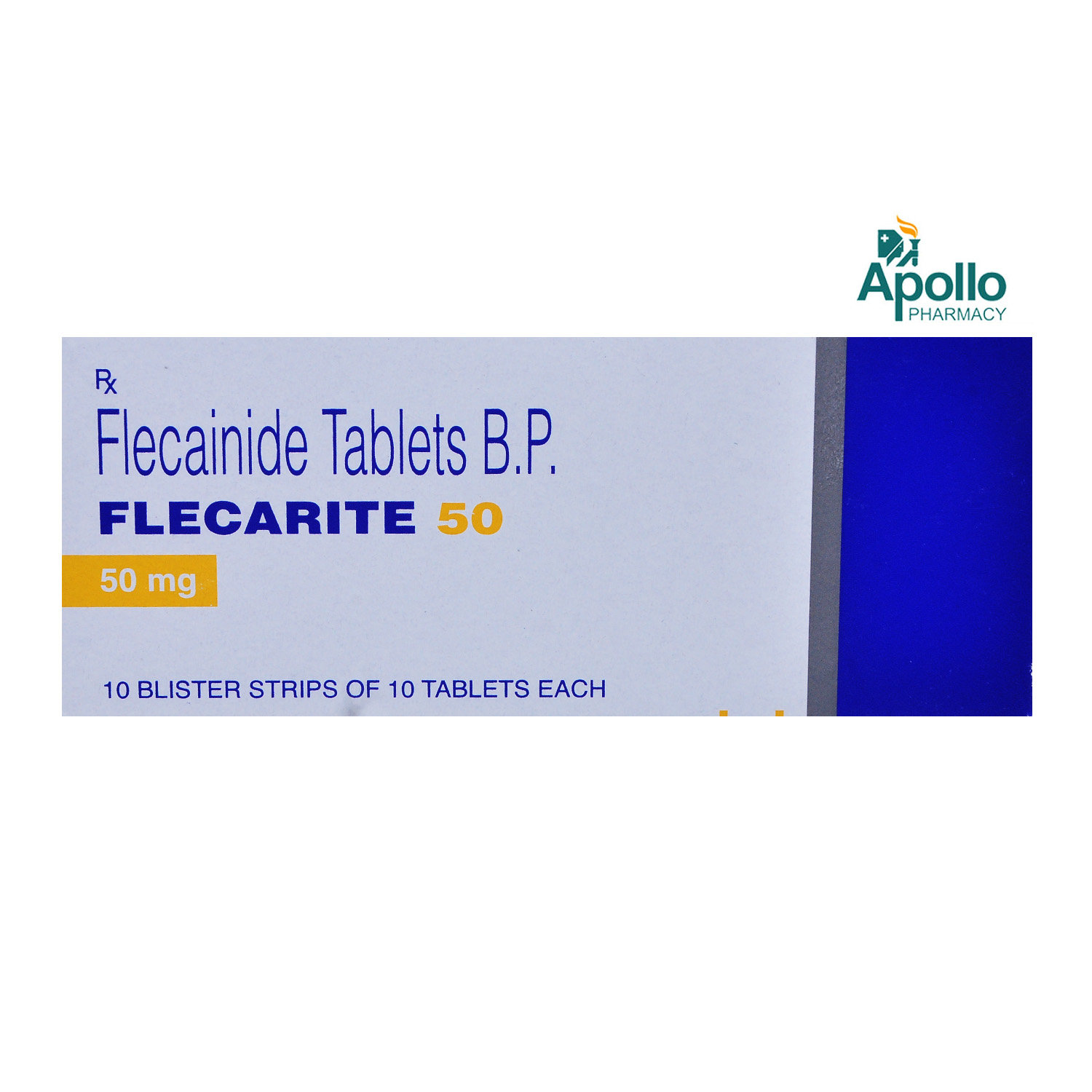Flecainide Acetate
About Flecainide Acetate
Flecainide Acetate belongs to a class of medicines called antiarrhythmics used to treat arrhythmias (irregular heartbeats) and tachycardia (fast heart rate). An irregular heartbeat is a condition in which your heart beats irregularly, too fast, or too slow.
Flecainide Acetate contains Flecainide acetate that works by reducing the sensitivity of heart muscle cells to electrical impulses. Thus, it slows down and regulates electrical conduction in the heart muscle. Thereby, it helps to restore regular heart rhythm.
Take Flecainide Acetate as prescribed by your doctor. You are advised to take Flecainide Acetate for as long as your doctor has prescribed it for you based on your medical condition. In some cases, you may experience blurred or double vision, dizziness, headache, nausea, or tiredness. Most of these side effects of Flecainide Acetate do not require medical attention and gradually resolve over time. However, if the side effects persist, please consult your doctor.
If you are allergic to Flecainide Acetate or any other ingredients, please tell your doctor. If you are pregnant or breastfeeding, it is advised to inform your doctor before taking Flecainide Acetate. Flecainide Acetate is not recommended for children below 12 years of age. Avoid intake of alcohol with Flecainide Acetate as it may increase dizziness. Flecainide Acetate may cause vision problems in some people. Therefore, drive only if you are alert after taking Flecainide Acetate.
Uses of Flecainide Acetate
Medicinal Benefits
Flecainide Acetate contains Flecainide acetate that decreases the sensitivity of heart muscle cells to electrical impulses. Thus, it slows down and regulates electrical conduction in the heart muscle. Thereby, it helps to restore regular heart rhythm. Also, it is used to treat atrial fibrillation (rapid muscle contractions in the heart).
Directions for Use
Storage
Side Effects of Flecainide Acetate
- Blurred or double vision
- Dizziness
- Headache
- Nausea
- Tiredness
Drug Warnings
If you are allergic to Flecainide Acetate or any other ingredients, please tell your doctor. If you are pregnant or breastfeeding, it is advised to inform your doctor before taking Flecainide Acetate. Flecainide Acetate is not recommended for children below 12 years of age. Avoid intake of alcohol with Flecainide Acetate as it may increase dizziness. Flecainide Acetate may cause vision problems in some people. Therefore, drive only if you are alert after taking Flecainide Acetate. You are recommended to avoid taking Flecainide Acetate if you have a heart block, cardiogenic shock (inability of the heart to pump as much blood as needed by the body) if you have ever had a heart attack, or have any other heart problems.
Drug Interactions
Drug-Drug Interaction: Flecainide Acetate may interact with medicines used to treat heart problems (amiodarone, verapamil, propranolol), anticonvulsants (phenobarbital, phenytoin, carbamazepine), antidepressants (paroxetine, fluoxetine, reboxetine, bupropion), medicines used to treat stomach ulcers (cimetidine), diuretics (water tablets), antimalarial drugs (quinine), anti-HIV drugs (lopinavir, indinavir, ritonavir), antipsychotics (clozapine) and medicines used to treat allergic reactions (mizolastine, terfenadine).
Drug-Food Interaction: Flecainide Acetate may interact with alcohol and increase dizziness. Therefore, avoid alcohol intake while taking Flecainide Acetate.
Drug-Disease Interaction: If you have a pacemaker, irregular or rapid heartbeat after heart surgery, or high or low levels of potassium in blood, kidney, liver, or heart problems, please inform your doctor before taking Flecainide Acetate.
Drug-Drug Interactions Checker List:
Safety Advice

Alcohol
unsafeYou are recommended to avoid consumption of alcohol with Flecainide Acetate as it may increase dizziness caused by Flecainide Acetate.

Pregnancy
cautionFlecainide Acetate is a Category C pregnancy drug and is given to pregnant women only if it is clearly needed and prescribed by a doctor.

Breast Feeding
unsafeFlecainide Acetate is not recommended for breastfeeding mothers as it may be excreted in breast milk. However, consult a doctor if you are breastfeeding before taking Flecainide Acetate.

Driving
cautionFlecainide Acetate may cause dizziness or changes in vision in some people. So, drive only if you are alert after taking Flecainide Acetate.

Liver
cautionTake Flecainide Acetate with caution, especially if you have a history of liver diseases/conditions. The dose may be adjusted by your doctor as required.

Kidney
cautionTake Flecainide Acetate with caution, especially if you have a history of kidney diseases/conditions. The dose may be adjusted by your doctor as required.

Children
unsafeFlecainide Acetate is not recommended for children below 12 years of age.
Habit Forming
Diet & Lifestyle Advise
- Maintain a low salt diet and minimize eating processed foods as they contain more sodium. Try to replace salt with spices or herbs to add flavour to the food.
- Do regular exercise as it helps lower blood pressure and keeps blood vessels and the heart in good condition.
- Quit smoking as smoking increases blood pressure and heart rate.
- Eat a balanced and healthy diet that includes plenty of vegetables, fruits, low fat or fat-free products.
Special Advise
- Certain tests are advised before taking Flecainide Acetate to monitor fluid levels, liver and kidney functioning.
- Low salt diet and regular exercise are recommended along with Flecainide Acetate for effective results.
Patients Concern
Disease/Condition Glossary
Arrhythmias (irregular heartbeat): It is a condition in which your heart beats irregularly, too fast, or too slow. Symptoms of irregular heartbeat include chest pain, shortness of breath, and fast or slow heartbeat. 60 to 100 beats per minute is generally considered a normal heart rate.
Tachycardia: Tachycardia means rapid heartbeat. A heart rate over 100 beats per minute is considered Tachycardia.
FAQs
Flecainide Acetate works by reducing the sensitivity of heart muscle cells to electrical impulses. Thus, slows down and regulates electrical conduction in the heart muscle. Thereby, it helps to restore regular heart rhythm.
Flecainide Acetate may cause dizziness as a side effect. It is not necessary for everyone taking Flecainide Acetate to experience this side effect. However, if the condition persists or worsen, please consult your doctor.
Flecainide Acetate may cause double or blurred vision in some people. Therefore, drive only if your vision is clear after taking Flecainide Acetate.
You are recommended to avoid taking Flecainide Acetate if you have heart block, cardiogenic shock (inability of the heart to pump as much blood as needed by the body), heart failure, long-standing atrial fibrillation (rapid muscle contractions in the heart), sinus node dysfunction (heart beats abnormally), Brugada syndrome (a genetic disease that causes severe disturbance of heart rhythm and may lead to sudden death) if you have ever had a heart attack or have any other heart problems.
You are not recommended to stop taking Flecainide Acetate without consulting your doctor as it may worsen the condition. Therefore, take Flecainide Acetate for as long as your doctor has prescribed it and if you experience any difficulty while taking Flecainide Acetate, please consult your doctor.





